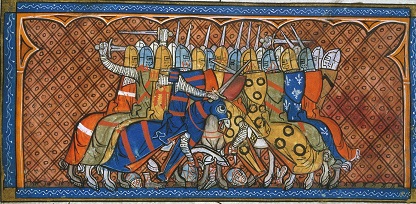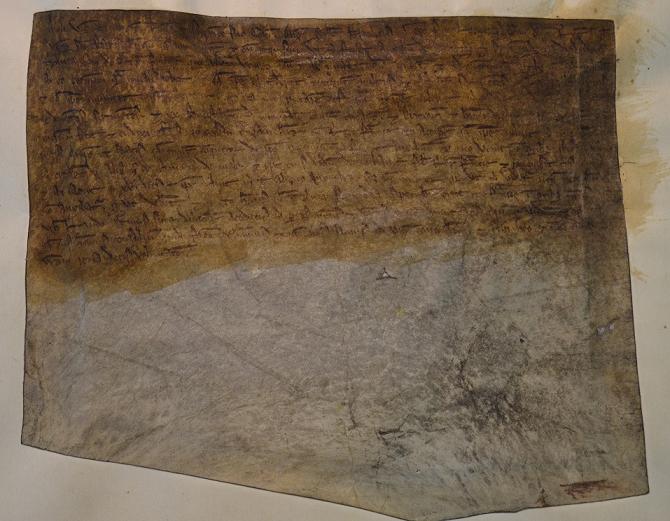A Letter of Aimery Vicomte of Thouars Intercepted by King John's Spies
September 2014,
By mid-August 1214, King John had heard of the defeat of his allies at Bouvines (27 July 1214). Arriving in Angoulême on Monday 17 August, the King then retraced the by now customary route northwards, via Cognac and Saint-Jean-d'Angély, to Saint-Maixent-l'École in northern Poitou. Only in the north could he hope to negotiate properly with the French, and Anglo-French negotiations by this stage must have been at the head of his priorities, as of the priorities of the local aristocracy. Aimery of Thouars, in a letter intercepted by John's spies, warned Ralph count of Eu, probably in the last week of August, that Philip Augustus intended to come south of the Loire in the first week of September, so that Ralph would do well to make common cause with Aimery, 'least you lose your head through your tail' (non dimittatis capud per caudam). Aimery, so his letters report, had met with John at Champdeniers, just north of Niort, on Saturday 23 August. There he had pleaded for help in defending his lands against the Capetian army that was daily expected, requesting the arrears of all money still owing to him together with 300 knights, 300 serjeants and 60 crossbowmen, and asking that the King himself send defence to Aimery's castle of Bressuire (Bercorii) The King instead offered only 200 knights, 200 serjeants and 20 crossbowmen to defend both Thouars and Bressuire, 80 kilometers south-east of Angers. The vicomte replied that, were a truce to be offered by the French, he would seek terms. The King denied him permission to enter into any such arrangement, at which point the meeting broke up. Aimery lamented not only that John had brought him no assistance, but that he refused to believe anything Aimery told him 'either for good or for ill'.
B = TNA/PRO SC 1/11 no.27. Contemporary copy, badly stained. Much rubbed. The text occupying only the top half of a parchment otherwise blank. Endorsed: 4876 (s.xix).
Pd (from B) Diplomatic Documents Preserved in the Public Record Office, ed. P. Chaplais (London,1964), 26-7 no.15
Aimeri vicecomes Thowarc' karissimo consanguineo suo comiti Augi salutem. Noueritis quod ego fui locutus cum domino rege Anglie in vigilia sancti Bartholomei apud Chaundiner' et eum requisiui ut michi faceret auxilium de militibus et seruientibus ad defendendum terram meam de rege Francie qui deberet venire cum maxima multitudine militum et seruientium in partibus nostris et perquirebam ab eo pecuniam quam michi debet et quod ipse michi traderet trescentos milites et trescentos seruientes et lx. balistarios et quod ipse muniret castrum Bercoirii et ita me putarem defendere. Et ipse nolebat michi tradere nisi ducentos milites et ducentos seruientes et xx. balistarios ad muniendum castra Thoarc' et Bercorii et bene indigent .... Bercor' .... nichil michi fecit. Et ei dixi quod, si ego possem treugam habere cum rege Francie, ego acciperem, quod ipse noluit concedere et recessi ab ipso. Et sciatis quod multum conqueror de ipso quia nullum michi fecit auxilium ex quo venit in partibus istis, nec voluit michi credere de aliquo nec de bono nec de malo, et propter eius defectum deuastauit filius regis Francie et combussit terram meam et ibi iacuit per xv. dies, et ipse noluit michi in aliquo auxiliari. Set non miror quia ut michi videtur vobis nec fratri vestro non auxiliatur prout deberet. Et pro certo habeatis quod in prima ebdomada Septembris erit rex Francie in partibus nostris, unde vobis laudo quatinus sine dilacione accedatis ad partes nostras et vestras et non dimittatis capud per caudam. Et oportet quod nos habeamus consilium quid facere debeamus et quod nos simus ad unam concordiam. Et super hoc et omnibus aliis vestram remandetis voluntatem.
Aimery vicomte of Thouars sends greetings to his dearest kinsman the count of Eu. Know that I spoke with the lord King of England at Champdeniers (Deux-Sèvres), on the vigil of the feast of St Bartholomew (i.e. 23 August 1214), and asked him for assistance with knights and serjeants for the defence of my land against the King of France, who should come to our parts with a great host of knights and serjeants, and I sought from him the money that he owes me and that he supply me with 300 knights and 300 serjeants and 60 crossbowmen, and that he garrison the castle of Bressuire so that I can think of defending it. And he did not wish to supply me more than 200 knights and 200 serjeants and 20 crossbowmen to garrison the castles of Thouars and Bressuire, so that <the men> of Bressuire entirely lack .... and he did nothing for me. And I said to him that, if I can have a truce with the King of France, I shall accept such a truce, which he did not wish to allow and so I departed from him. And you should know that much follows from this, because he gave me nothing of the assistance for which he came to these parts, nor did he wish to believe me in anything, either for good or for bad. And it was through his fault that the son of the King of France pillaged and burned my land and remained there for a fortnight. But I do not marvel at this since it seems to me that neither you nor your brother are assisted as is appropriate. And you should know for certain that the King of France will be in our parts in the first week of September, whence I urge you, without delay, to come to yours and our parts, so that you do not lose your head through your tail. And it is important that we take counsel together what we should do and that we be of one accord. And on this and all other matters, reply to us with your wishes.
Referenced in
Magna Carta and Peace (The Itinerary of King John)
John’s spies intercept a letter of Aimery of Thouars (The Itinerary of King John)
- January 2016
Exchange of Letters between King and Rebels - December 2015
Partridges and a Pear Tree - December 2015
The Saving Clause in Magna Carta - December 2015
Christ's College and Magna Carta - November 2015
The Arms of Roger Bigod - October 2015
Ten Letters on Anglo-Papal Diplomacy - September 2015
The Leges Edwardi Confessoris - July 2015
New Letter of the Twenty-Five - July 2015
Runnymede and the Commemoration of Magna Carta - June 2015
Who Did (and Did Not) Write Magna Carta - June 2015
Date of Magna Carta - June 2015
A Lost Engrossment of 1215? - May 2015
A Glimpse of Rebel London - May 2015
The Rebel Seizure of London - May 2015
Papal Letters of 19 March - May 2015
The Copies at Lincoln and Salisbury of the 1215 Magna Carta - May 2015
The copies of Magna Carta 1216 - May 2015
The Magna Carta of Cheshire - April 2015
Dating the Outbreak of Civil War - April 2015
More from the Painter Archive - April 2015
A Magna Carta Relic in Pennsylvania - April 2015
A Lost Short Story by Sidney Painter - April 2015
King John's Banners and Battle Flags - March 2015
King John’s Lost Language of Cranes - March 2015
Magna Carta and Richard II's Reign - March 2015
The King Takes the Cross - February 2015
Irish Fines and Obligations - January 2015
John negotiates with Langton over Rochester - January 2015
Conference at New Temple - December 2014
Simon de Montfort's Changes to Magna Carta - November 2014
Meeting at Bury St Edmunds - October 2014
King John Forgets his Password - September 2014
Treaty 18 September 1214 - September 2014
Letter of King John 9 July 1214 - September 2014
Letter of Aimery Vicomte of Thouars - August 2014
The Freedom of Election Charter - July 2014
The Witness Lists to Magna Carta - April 2014
The Cerne Abbey Magna Carta - March 2014
Confirmation of Magna Carta in 1265

